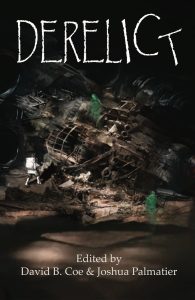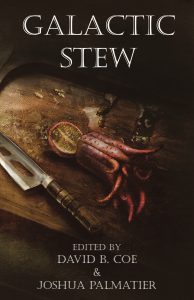Other stories — fictions as well as legends based in truth — shape our languages and our ways of thinking, our imaginations and, yes, the stories we add to humanity’s opus. Every story we tell is, in a sense, a new entry in an ongoing dialogue among storytellers that goes back generations.
During one of the several writing panels I spoke on this past weekend at JordanCon, my fellow panelists and I painted a fairly bleak picture of the current state of the market for writers. Falling advances, shrinking publicity budgets, purges of editors at various publishing houses — the litany of alarming trends goes on and on. Contracting with a big-name New York publisher is becoming ever more difficult, leaving aspiring writers with fewer options outside of self-publishing, which remains a hard road for authors who don’t already have a prominent social media presence. And even for more established writers, myself included, small press publishing has become the more attractive and realistic option.
All of this means less money and more work, almost regardless of how much visibility and experience an author might have.
Which begs the question, why keep at it?
This is a question I have asked myself often over the course of a career that has seen its share of ups and downs. I am sure I have even addressed the issue in one way or another on this blog. But I feel the answer bears repeating.
I keep writing because I love to tell stories, and I still have ideas for novels and short fiction that speed my pulse and light my creative vision. I love to give voice to the myriad characters in my imagination who clamor for my attention. I love world building, discovering new places in which to set my narratives, building exciting histories (yes, I’m a history geek, and, for me, “exciting histories” is NOT an oxymoron . . .) constructing cool magic systems. I love it all. Stop writing? I might as well stop thinking.
More than that, though, storytelling is, to my mind, central to who we are as humans. Every holiday we celebrate, secular or faith-based, comes with a story. And when we share those tales of achievement, or triumph, or spiritualism with our children, we pass to them our shared values, our customs, our beliefs. Societies and cultures define themselves with their stories.
Other stories — fictions as well as legends based in truth — shape our languages and our ways of thinking, our imaginations and, yes, the stories we add to humanity’s opus. Every story we tell is, in a sense, a new entry in an ongoing dialogue among storytellers that goes back generations.
Depending upon who you ask, there are really only twenty types of stories. Or seven. Or three. And regardless of what number you agree with, I suppose there might be some truth to this notion. Stories can be categorized if the listing parameters are drawn loosely enough. Another way to look at it is that every story is different and there are as many stories as there are storytellers and ideas. I edit anthologies, and I have seen authors — literally hundreds of them — take a single theme and each create something utterly unique.
Three basic stories, or billions of them? I can go either way. But I believe with all my heart that every writer is engaged in that dialogue I mentioned a moment ago. Stories are embedded in culture, which in turn shapes each new story, which then informs the next generation of creators. Which suggests that we who write are engaged in an undertaking of near cosmic proportion, one that dwarfs the individual.
So is that why we write?
Maybe.
Or maybe we write because we’re writers and what else are we going to do with our days? Maybe we write because as hard as it might be, it’s still a way to make a living.
From the sublime to the ridiculous. Yes, ridiculous. Don’t believe me? You should see my most recently royalty statement . . . [Rimshot]
I come back to how I began. I write because writing is what I love to do. I am profoundly grateful and unbelievably fortunate to have a spouse who loves me and supports me in all ways imaginable. And thus I am able to make a career of my passion. It is not always easy. I have, on more than one occasion over the past quarter century, considered giving up.
But for better or worse, this is what I do, what all of us writers do. And the eternal dialogue awaits our next entries.
Keep writing.









 Last year, I co-edited Derelict. We received more than four hundred stories. The year before, I co-edited Galactic Stew. We received more than four hundred stories. The year before that, I co-edited Temporally Deactivated. We received more than two-hundred and fifty stories. Again, these are submissions for a total of six or seven slots.
Last year, I co-edited Derelict. We received more than four hundred stories. The year before, I co-edited Galactic Stew. We received more than four hundred stories. The year before that, I co-edited Temporally Deactivated. We received more than two-hundred and fifty stories. Again, these are submissions for a total of six or seven slots. Along similar lines, ZNB anthologies are themed, which means that all the stories are about something in particular. Galactic Stew was about food. Derelict was about abandoned or lost ships. Noir is about detectives, in SF, fantasy, horror, or paranormal settings, investigating mysteries. As with the GLs, anthology themes are not suggestions. We’re not saying “If you feel like writing about detectives, feel free, but we’ll take any story about anything.” We’re saying, “For this anthology, we want detective stories with a speculative fiction element.” I can’t tell you how many stories we get that have nothing at all to do with our theme. I CAN tell you that we reject every last one of them. If you send to a themed anthology open-call a story that is off theme, it will not be accepted. Ever. Full stop.
Along similar lines, ZNB anthologies are themed, which means that all the stories are about something in particular. Galactic Stew was about food. Derelict was about abandoned or lost ships. Noir is about detectives, in SF, fantasy, horror, or paranormal settings, investigating mysteries. As with the GLs, anthology themes are not suggestions. We’re not saying “If you feel like writing about detectives, feel free, but we’ll take any story about anything.” We’re saying, “For this anthology, we want detective stories with a speculative fiction element.” I can’t tell you how many stories we get that have nothing at all to do with our theme. I CAN tell you that we reject every last one of them. If you send to a themed anthology open-call a story that is off theme, it will not be accepted. Ever. Full stop.